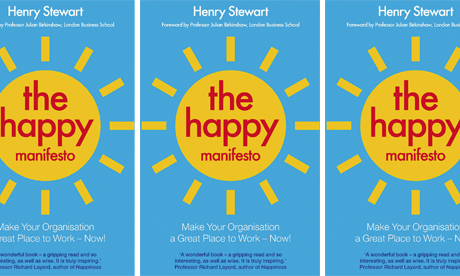The Happy Manifesto: a blueprint for workplace bliss?

Don't worry: be happy
In the end, even pop psychology flows from Freud. It was the father of psychoanalysis who so eloquently described how our forebears banded together in the service of that most primitive of industries, agriculture. They diverted their energies away from satisfying primeval instincts and ploughed them into a project: civilisation.
Fast forward thousands of years and many of us are employed in office jobs, but the psychological mechanisms at work are no less powerful. They can crush our creativity and corrode individuality.
Or as Professor Julian Birkinshaw of the London Business School puts it in his foreword to longtime Stoke Newington resident Henry Stewart’s book The Happy Manifesto: “The vast majority of workplaces are stultifyingly dull. The physical surroundings are drab. Many jobs are designed to be as repetitive and soulless as possible. Fear is endemic. Many bosses, as Stanford’s Bob Sutton would say, are assholes.”

Happy Manifesto author Henry Stewart. Photograph: Miriam Stewart
Mr Stewart, an entrepreneur and the chair of governors at Stoke Newington School, passionately believes it doesn’t have to be like this. Not only that, he insists companies can boost their productivity by being pliant to their employees’ wishes and removing obstacles that hamper their enjoyment at work: “Imagine a workplace where people are energised and motivated by being in control of the work they do,” he says. “Imagine they are trusted and given freedom.”
His book contains many useful, practical suggestions for heads of organisations, many drawn from his own experience as chief executive of the training company Happy Ltd, which he founded as Happy Computers in his back room in Hackney in 1988. The company now trains 20,000 people a year and has been widely commended both for the way it treats its personnel and for its work in the community.
Stewart dislikes excess rules. His manifesto calls for a less intrusive form of management. Managers, he says, often get in the way. Their desire to have ‘sign off’ on decisions, however well intentioned, can damage workers’ self-esteem. Give people the tools to make decisions themselves, and information such as the budget for a project, and they will find solutions just as effectively as more senior staff.
Another thing that gets Stewart’s goat is the unbending stance most companies take towards staff working specific hours. Who says the company’s routine will suit everyone? And if it doesn’t, are some people working less effectively than they might otherwise?
Stewart gives the example one of his employees who would always roll in for work exhausted on a Monday morning after going clubbing the previous night. Instead of giving the young scenester a slap on the wrist for letting his social life damage his effectiveness and rigidly insisting that he show up for work at precisely the same time as his more sober colleagues, Stewart agreed to the reveller working a shorter day on Monday by arriving later and making up the hours on other days when he was less tired. If only all bosses were this accommodating!
The importance of Corporate Social Responsibility (CSR) is another theme of the book, and Stewart insists that companies’ involvement in communities should make a genuine difference.
He recalls giving a talk at a conference about CSR: “As I looked around the room, I saw companies which I knew treated their staff badly,” he writes. “I saw companies whose core product was bad for people and bad for the environment. And I saw one company who spent far more on advertising the good work they did than on the good work itself. I am reminded of a cartoon in a UK newspaper which showed a huge mining company despoiling the earth, but their protective helmets were made from recycled plastic.”
His slim volume ends with a call to arms, a kind of “Bosses of the world, unite!”, and the hope that more companies will learn from major corporations such as John Lewis, WL Gore and Google, which Stewart says put the happiness of their workers at the heart of what they do.
But Stewart’s is a brave new world and one suspects that for too many workers Sunday night will continue to be a time of great foreboding.
The Happy Manifesto by Henry Stewart is published by Happy, priced £9.99.
